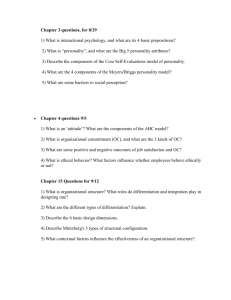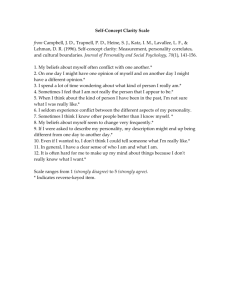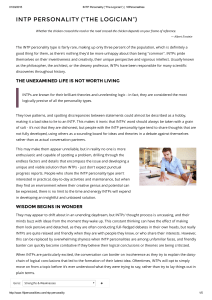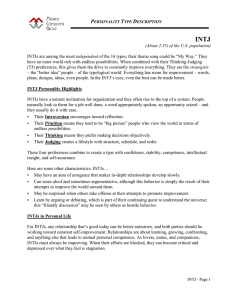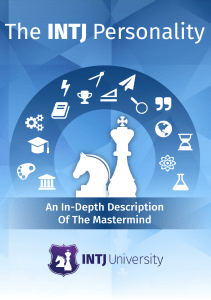ENGR 408 – Paper 1: Personality Tests and
advertisement
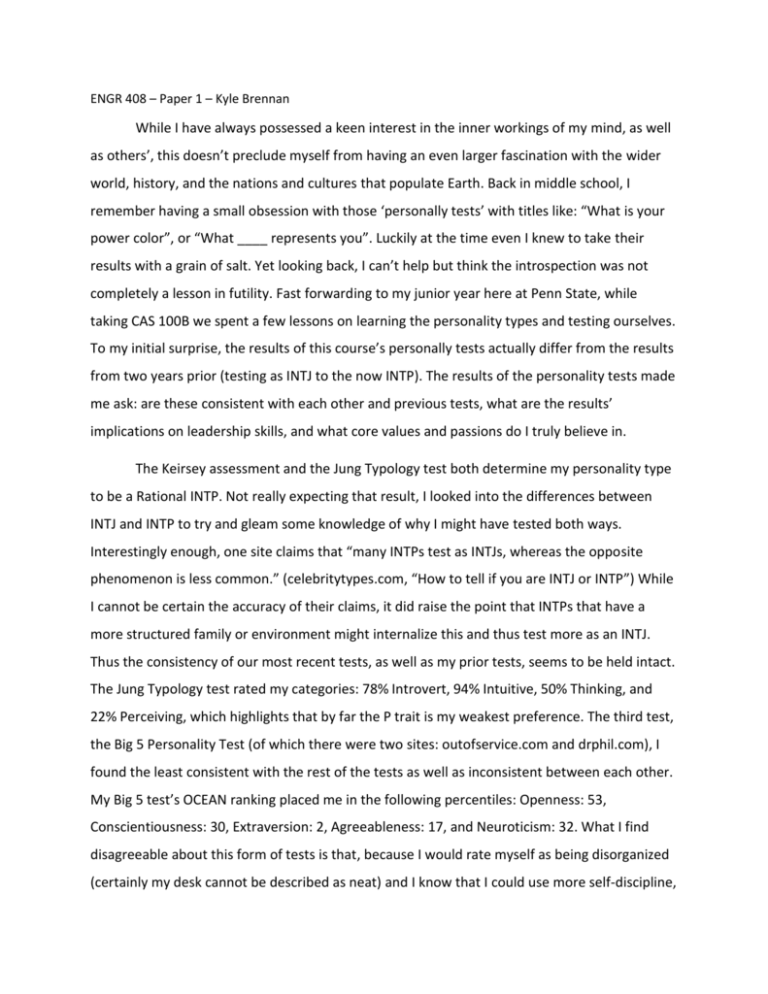
ENGR 408 – Paper 1 – Kyle Brennan While I have always possessed a keen interest in the inner workings of my mind, as well as others’, this doesn’t preclude myself from having an even larger fascination with the wider world, history, and the nations and cultures that populate Earth. Back in middle school, I remember having a small obsession with those ‘personally tests’ with titles like: “What is your power color”, or “What ____ represents you”. Luckily at the time even I knew to take their results with a grain of salt. Yet looking back, I can’t help but think the introspection was not completely a lesson in futility. Fast forwarding to my junior year here at Penn State, while taking CAS 100B we spent a few lessons on learning the personality types and testing ourselves. To my initial surprise, the results of this course’s personally tests actually differ from the results from two years prior (testing as INTJ to the now INTP). The results of the personality tests made me ask: are these consistent with each other and previous tests, what are the results’ implications on leadership skills, and what core values and passions do I truly believe in. The Keirsey assessment and the Jung Typology test both determine my personality type to be a Rational INTP. Not really expecting that result, I looked into the differences between INTJ and INTP to try and gleam some knowledge of why I might have tested both ways. Interestingly enough, one site claims that “many INTPs test as INTJs, whereas the opposite phenomenon is less common.” (celebritytypes.com, “How to tell if you are INTJ or INTP”) While I cannot be certain the accuracy of their claims, it did raise the point that INTPs that have a more structured family or environment might internalize this and thus test more as an INTJ. Thus the consistency of our most recent tests, as well as my prior tests, seems to be held intact. The Jung Typology test rated my categories: 78% Introvert, 94% Intuitive, 50% Thinking, and 22% Perceiving, which highlights that by far the P trait is my weakest preference. The third test, the Big 5 Personality Test (of which there were two sites: outofservice.com and drphil.com), I found the least consistent with the rest of the tests as well as inconsistent between each other. My Big 5 test’s OCEAN ranking placed me in the following percentiles: Openness: 53, Conscientiousness: 30, Extraversion: 2, Agreeableness: 17, and Neuroticism: 32. What I find disagreeable about this form of tests is that, because I would rate myself as being disorganized (certainly my desk cannot be described as neat) and I know that I could use more self-discipline, the test ranks my conscientiousness very low and correlates that to being undependable, negligent, and not likely to do a task well. The fourth and optional test, the Emotional IQ test, only told me I scored 70/100. Although it neglected to tell me in what ways or categories I could improve my EIQ, simply taking the test and having slight difficulty on certain sections are clues to my deficiencies. These weaknesses stem from some difficulty reading facial expressions as well as differences between what should be done and what I would probably do in several moral situations (this usually related to confronting an unethical boss/manager). While it is not surprising that these tests are limited and cannot fit our personalities and quirks into a perfect model, they can offer valuable insight into individual strengths and weaknesses. Being a Rational type, according to the Keirsey assessment, my inclinations lean towards result-driven, efficient, and pragmatic approaches, as opposed to first and foremost adhering to social conventions and a code of conduct while working out a problem. The other part of the Rational archetype is embracing the abstract over the concrete in communication, where ideas and concepts are presented more often than the external, everyday reality. As a team or business leader, it can be productive yet dangerous to strictly adhere to my rational tendencies. While many companies are result-oriented, profit-driven and seek efficient methodologies, the weaknesses associated with such motivations is a de-emphasis on the moral and ethical social obligations. As a team leader working with the other personality types, I would have to be careful not to set unrealistic goals or focus too narrowly on efficiency and productivity at the expense of the team’s personal development and culture. Of the four generalized personality types – the Guardians, the Idealists, the Artisans, and the Rationals – the Rationals think and communicate in terms of new problems and pragmatic solutions while ignoring arbitrary rules seen as speed bumps. It is thus possible that when interacting with other personalities a rational personality could offend the others by “playing fast and loose” or by driving the team too mechanically towards an objective, only focused on the end result. A team composed of one of each personality type could be a very strong and dynamic group, yet they would have to compromise between the tendencies of each member. The Idealist and Rational members may both arrive at different ways to solve the problem, yet disagree on whose method is the best. In this kind of situation members would need to defer to each other’s strengths to compensate for any individual weaknesses. The Rational would have to realize that they need to defer to the rules and restrictions set down by the Guardian, yet could easily build upon any idea presented by the Idealist by taking it to its logical conclusion or by improving it systematically. On a personal level I have many values and passions that may be expected from a rational INTJ and yet also hold values that are atypical. For instance, when reading about the Rational personality type they can almost be described by “the end justifies the means”, yet a core value of mine is a combination of sincerity and doing what is morally ‘right’. I understand the world is not black and white with moral gray areas, but I detest nothing more than when morality is forgone in the pursuit of greed or intentional insincerity. Both of which I feel are too commonplace in the corporate world, whether it be illegally disposing of waste/pollutants to intentionally deceiving customers. On a more personal scale, I place extremely high value on critical thought and creativity, because as simple and ubiquitous as they both seem to be they should be more commonly employed in our society. Not enough people are critically thinking about the agenda or bias their sources of information have. Creativity is also valued because it brings the human element into the abstract world of figures, numbers, and solutions. For example, in any project or presentation the data must be digestible and interesting enough to capture the audience’s attention and sell them the message. While I have a hard time defining all my passions, the ones that are always on the top of my head (or close to my heart) include: learning, making a difference, literature/reading, biking, and last but not least games. The first few are for obvious reasons: I love reading books and anything that will expand my knowledge, while making a difference is also highly important and interestingly enough was touched upon in Christensen’s article “How will you measure your life”. Although I probably cannot change the entire world or country for the better, it is a reward in itself knowing you are making a positive difference one person at a time. I am passionate about gaming due to my competitive nature as well as my love for strategizing and out-witting my opponent such as in Chess, Stratego, or simply video games. When I first read the quote, “The fox knows many things, but the hedgehog knows one big thing”, I thought it was similar to the saying, “A jack of all trade but master of none”. Yet upon looking into this I realize it is more philosophical than that and instead relates to perception and world views. Whereas the hedgehog sees the world through a single defining idea, the fox with a large array of experiences cannot condense these into a single ‘lens’ through which to view the world. I would have to say I see myself as the fox in this scenario since I am unable to really define an idea that is all encompassing. That doesn’t mean that one day I might not find an idea that would make a hedgehog out of me. At this time, other than the inevitability of death, I don’t see any single idea as the hegemon of my world view is one of many interweaving complexities that defy condensation. While this assignment may not have altered my outlook, it definitely pushed me into researching more about personality types and the strengths and weaknesses associated with them. It helped me gain a greater understanding of myself which I hope will also allow me to understand the individuals around me.
